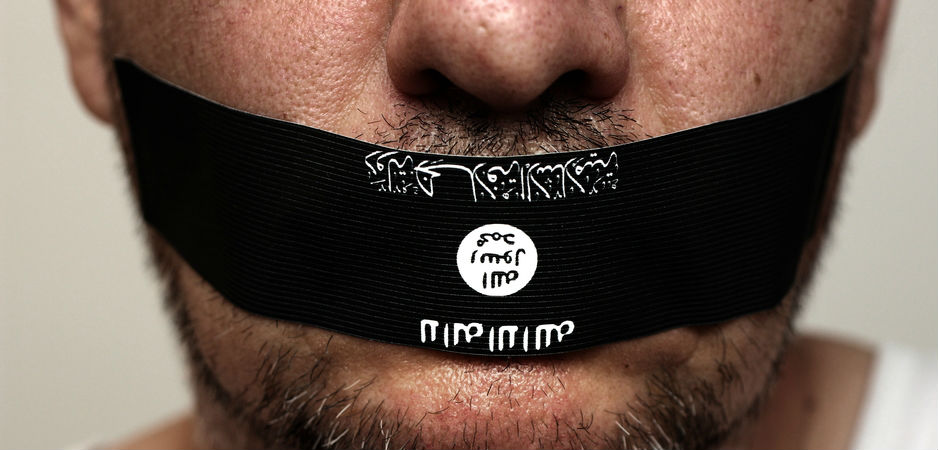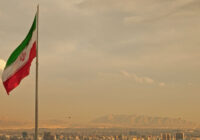Knowingly or unknowingly, we may be supporting and promoting groups like Daesh instead of crippling and destroying them.
In the fight against terrorist groups or cults, we should take care not to promote them in any way or to make it easier for them to recruit. Our first line of defense should be to understand their strengths and weaknesses, in order to match their strengths and attack their vulnerabilities.
There are three Hs that matter most in people’s lives: health (of body and soul), honor and happiness. Destructive and terrorist cults are masters of deception, with their black-and-white worldview. They appear to be offering a simple, strict and easily understood definition of these three concepts to their followers.
A cult’s definition of the three Hs will infiltrate deep into the mind and soul of its followers and stay deep in their unconscious, even years after they leave the group. The promise of these three Hs can be very attractive, especially to young people, and this ability to convince and deceive is the cult’s main strength, and one that should worry us most.
Honor
The formula for defining honor in most cults, especially those that may be called destructive or terrorist groups, is very simple: love/worship/praise (X) and hate/resist/fight (Y). The only thing that is needed to make this formula complete is to replace X and Y with a popular idea, which can later be defined and elaborated by the cult leader.
For example, all “religious” cults, including Jehovah’s Witnesses, the Moonies, al-Qaeda, Daesh (Islamic State) and Mujahedeen-e-Khalq (MeK), will substitute X with God/Christ/Islam and Y with the Devil/Satan/the anti-Christ/enemies of Islam. Political or nonreligious cults might replace God with the people/freedom/democracy and the devil with imperialism or dictatorship.
In order to recruit young Muslims, al-Qaeda, Daesh and MeK claim that their ideology is Islam and that they are fighting the enemies of the religion. They have all exploited two important Islamic concepts, jihad (struggle) and shahada (giving witness), and have developed a doctrine around these ideas by giving them twisted, wrong definitions.
Jihad (greater and lesser struggle), according to the majority of Muslim jurists (except the Wahhabi and Salafi), is defined as a struggle against wrongs in the mind and behavior of a Muslim or in a Muslim community (greater jihad), or defending a Muslim community against aggression by enemies (lesser jihad). Both greater and lesser jihad have many rules and conditions set in the Quran and hadith (sayings of the Prophet Muhammad).
Shahada (giving witness or martyrdom) also has a very clear definition throughout all the different sects of Islam, but terrorist cults have given a new distorted meaning to both notions, changing them into “killing” and “dying,” even by suicide bombing. MeK, al-Qaeda and Daesh have violated all the norms and rules of jihad and shahada through acts of terrorism, such as killing of unarmed civilians, women, children and the elderly, and bombing places of worship.
However wrong or distorted and anti-Islamic their definition in the view of most Muslims, they have given a new meaning to the word honor, namely fighting and dying for the cause of the group and the desires of the leader. Of course, it is easy to show that what they do has nothing to do with Islam, jihad or shahada, but when the cult has manipulated a person’s mind, from then on he or she is utterly reliant on the leader for understanding the doctrine of the cult and the meaning of honor.
What they replace those dots with is not as important as how they define them. For example, in MeK, along with the fluctuating whims and interests of its leader—Masoud Rajavi—how to love and worship God and resist and fight those who oppose them has changed many times. “God” has been substituted or supplemented by “the people,” “independence,” “freedom” or “human rights”; and the “devil” has become “exploitation,” “imperialism,” “Zionism” or “dictatorship.”
At the same time, Rajavi has been able to define these ideas as he wishes. For example, he has defined people and love for the people in such a way as to justify support for international sanctions against Iran. He has defined honor as a fight for the independence of Iran and opposition to imperialism, while at the same time ordering his followers to join Iraq in fighting Iran during the Iraq-Iran war. And now he is encouraging warmongering, right-wing Americans to attack Iran and ruin the country, as they did in Iraq.
MeK’s definition of freedom rests on the notion that a person permanently suppresses his or her individuality, desires nothing personal, abandons family life and accepts celibacy. According to this definition of freedom, followers feel they are the freest people on earth, overlooking the fact that with this definition its subjects have no individual desire, ambition or want. These days, MeK defines honor for its followers simply as love, loyalty and obedience toward the Rajavis (husband and wife, the leaders of the group) and hatred toward the Iranian regime, which the Rajavis wish to overthrow in order to become the next leaders of the Iranian people.
This definition of honor sticks to the mind and mentality of followers and will direct and justify all their thoughts, feelings and behaviors even years after leaving the cult. Recently, I overheard about some ex-members of MeK insulting other former members, calling them traitors or mercenaries in the employ of the enemy, because they had abandoned the “honorable goals” planted in their minds when they were part of the cult. Years after leaving the group, the name-callers still feel they are honorable because of their “struggle” within the group.
I noticed the same kind of argument being proffered by some ex-followers of other cults, claiming that the doctrine and goals of the groups were sound and only the leadership was wrong, and that they were going to stick to that doctrine. What they fail to realize is that these “goals, “honor” and “doctrine” are, in this context, nothing more than words without any substance. Whatever the words used—freedom, imperialism, justice—ex-members of a cult should know that they simply reflect the leader’s interests.
It is very difficult for ex-members, who have made great sacrifices and paid an enormous price for being in the cult, to reject the concepts of the doctrine or the honor that they have learned within the cult, and instead seek new principles to live by. Unless they succeed in finding a better meaning of honor, they are condemned to be unhappy and, in many cases, to remain a follower at heart, without knowing how or why.
Health
Health (physical, psychological and emotional) is another prerequisite for a happy life. Again, in destructive cults there is a very clear and strict, unequivocal definition of health. Physical health is important as long as one is struggling to pursue the cult’s goals, but it can and should be sacrificed as a mark of honor when needed.
In destructive cults, followers do not need to think about their physical health (including their essential needs such as food and shelter), as the group acts as a kind of insurance, guaranteeing them the fulfilment of all their physical needs and lifelong care. They achieve this by, first, drastically reducing each person’s personal expectations about his or her physical needs, and, second, by channeling the resources of the cult toward specific needs when necessary.
In addition, cults, by rejecting individuality, which they describe as the ugliness of selfishness, dramatically reduce the psychological needs of individuals, offering them a collective life, comradeship and brotherhood/sisterhood, common goals and the security of the cult’s character.
Cults deal with the emotional health or needs of their followers by labeling outsiders as the enemy and dehumanizing them, thus psychologically isolating their followers from the outside world and their familiar social milieu, and neutralizing any feelings they may have for their loved ones. At the same time, the cult portrays itself as a family, cult leaders as parents and other cult members as friends/comrades or siblings, thereby creating a new set of feelings and emotions among the followers, which can easily be directed, controlled and satisfied by the leader.
Cults also instill a new set of beliefs in their followers about their sexual needs, which can be met by free sex, arranged marriages or sex without emotion and family ties, or denied by eliminating sex from their lives altogether.
Happiness
Destructive cults, by rejecting all the social and family responsibilities and expectations of their followers and their individual needs and desires, claim to provide the health component of happiness. More importantly, by creating a strong belief system and a clear, simple and achievable definition of honor and being honorable, they promise their followers an illusion of happiness, which seems satisfactory, although to outsiders it seems strange, wrong and unacceptable. This capacity to delude their followers is one of the great strengths of destructive and terrorist cults that enable them to recruit and hold on to their followers.
In the fight against terrorist groups or cults, we should take care not to promote them in any way or to make it easier for them to recruit.
Most of us would, of course, argue that this kind of happiness is a sham, an illusion, and is only achievable via some sort of mind manipulation or brainwashing. But the reality is that it can be and has been achieved within cults, and we have yet to find an answer or antidote for it.
For us in the West especially, it is very difficult to imbue young people with a sense of the three Hs, particularly honor, given that all three Hs have been commercialized and given ambiguous and sometimes unachievable meanings. The mass media and advertising give young people the impression that, to feel good, proud and honorable, they have to be rich, famous, good looking, with fit and beautifully proportioned bodies and, perhaps, endowed with immense artistic or scientific talent. It is almost impossible to define honor for an ordinary individual by reference to an idea such as nationalism or a belief in a religion or philosophy, without pushing them toward becoming racist, dogmatist or superstitious. For other meaningful, achievable and admirable values, such as caring for nature and humanity or standing up against exploitation, there is a lack of teaching and incentives in our families, schools and the media.
With respect to health, again, the monopolization of its meaning by the mass media and its exploitation by the dollar is, to say the least, unfortunate. Similarly, happiness for our younger generation tends nowadays to mean joy, fun and lust.
Promoting Cults Instead of Destroying Them
In defining the three Hs, we in the West are, therefore, at our weakest, while destructive and terrorist cults are at their strongest. In this situation, the worst thing that we might do is to attack them from this angle.
This is why I believe that those who direct their attacks to the ideology of destructive cults—often by blaming Islam and portraying Islam and Muslims as the root causes of terrorism—are promoting and supporting these cults and, knowingly or unknowingly, facilitating recruitment to them.
I am not referring to groups that are themselves cults in some form and that feed on hate. For them, the existence of other destructive or terrorist groups gives them ammunition with which to promote their own philosophy and agenda and to recruit. Rather, I am referring to our governments, our police, our old and established media and even those who claim to be fighting cults and terrorism. They too, in some cases, by calling these groups Muslim or jihadist and by attacking their doctrine, knowingly or unknowingly support and promote them instead of crippling and ultimately destroying them.
The views expressed in this article are the author’s own and do not necessarily reflect Fair Observer’s editorial policy.
Photo Credit: Alexskopje / Arda Savasciogullari / Shutterstock.com
 We bring you perspectives from around the world. Help us to inform and educate. Your donation is tax-deductible. Join over 400 people to become a donor or you could choose to be a sponsor.
We bring you perspectives from around the world. Help us to inform and educate. Your donation is tax-deductible. Join over 400 people to become a donor or you could choose to be a sponsor.
Support Fair Observer
We rely on your support for our independence, diversity and quality.
For more than 10 years, Fair Observer has been free, fair and independent. No billionaire owns us, no advertisers control us. We are a reader-supported nonprofit. Unlike many other publications, we keep our content free for readers regardless of where they live or whether they can afford to pay. We have no paywalls and no ads.
In the post-truth era of fake news, echo chambers and filter bubbles, we publish a plurality of perspectives from around the world. Anyone can publish with us, but everyone goes through a rigorous editorial process. So, you get fact-checked, well-reasoned content instead of noise.
We publish 2,500+ voices from 90+ countries. We also conduct education and training programs
on subjects ranging from digital media and journalism to writing and critical thinking. This
doesn’t come cheap. Servers, editors, trainers and web developers cost
money.
Please consider supporting us on a regular basis as a recurring donor or a
sustaining member.
Will you support FO’s journalism?
We rely on your support for our independence, diversity and quality.







